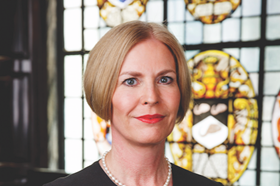I’m sure I’m not alone in reflecting how this awful pandemic has had a strange impact on time.

It feels like yesterday when we were holding the international symposium when we introduced the Women in Law Pledge and in other ways, it seems like an eon ago!
In June 2019, I was privileged to launch the Women in Law Pledge at the two-day conference which was attended by over 400 delegates from all over the world.
The Pledge was the final piece of our three-year programme to investigate why women were not attaining leadership positions in law commensurate with their aspirations, skills, expertise, experience and sheer numbers; to identify how to solve these problems and to get everyone to become activists for gender equality in our profession.
We conducted the largest ever global survey on this subject, and, for the qualitative research undertook 250 roundtables in 19 countries. For these roundtables, we produced toolkits with the dual purpose of getting all attendees to focus on the issues identified through the survey and to give people practical ways that they could personally make a difference back in their own firms and organisations.
We involved tens of thousands of lawyers around the world, and I had the privilege of facilitating 48 roundtables in 18 countries from Ukraine to Brazil, Rwanda to New Zealand.
I learned so much from that humbling and enriching experience and I believe for many of the attendees, it was transformative.
They experienced the comfort from knowing that, across the world, the experience of women lawyers was similar and that they had many, many supporters who were willing and able to help them to make positive change.
We produced three insight reports; one for the domestic women’s roundtable, one for the men’s and another for the international events.
From these insights, one thing became abundantly clear; across the globe, women working in law face systematic bias which is a significant barrier to career progression and fair and equitable treatment.
This is magnified for women with additional protected characteristics, however, there are some actions which can be taken which really work to level the playing field, increase profitability, and improve working life for all.
With this in mind, and the reports and data under our belt, we worked with the International Bar Association, the Bar Council, CILEx and the Ministry of Justice, to distil the most important findings from the whole programme into the eight points of the Women in Law Pledge.
Thematically, it is all about leadership, setting achievable targets and accountability. The Pledge aims to help you on your diversity and inclusion journey, so you set the targets that are right for your business, organisation, or law firm.
The Pledge asks organisations across the profession to work together, to be thoughtful in creating meaningful change for women’s equality and to take an active role in a better, more inclusive future.
It is a public commitment, supported by senior buy-in, to pledge to improve diversity and inclusion.
Of course, the Law Society will provide help with all of this and there is some useful guidance on the website. Colleagues from other firms who have already signed up (and there are many from a wide variety of organisations) have also offered to assist.
This is one area of the law where collegiality trumps competition, with a broadly shared common desire to raise the bar for all.
I believe that every single law firm, legal department, barrister’s chambers and legal organisation could sign up to the Pledge and that it would be revolutionary for women – now and in the future - in those businesses.
By signing up to the Pledge, you will shift the dial for inclusion in your business, create greater gender balance and be on your way to ensuring a profitable and sustainable future.
What was clear throughout our research was that taking action around gender inequality has a positive impact for everyone.
One of the key recommendations related to flexible and agile working and over the last year, in a world blighted by pandemic, whilst office workers have experienced both the positives and challenges of fully remote working, it has shown that we, as a profession, are capable of adapting and evolving to create positive and progressive changes.
This is our chance to embed positive change.
It is likely most organisations will be preparing a plan which focusses on getting the ‘new normal’ – why not develop working environments which are right for everyone, including working parents.
Take this opportunity to develop a more successful future for all as the challenges which women (who are the majority of the legal workforce) face, often have significant read through for everyone.
I would suggest there’s a compelling case for action and, by adopting the Pledge, you get the framework and the support to make this change lasting and significant.
To celebrate the two-year anniversary of the Women in Law Pledge and to reflect on how women have been impacted during the course of the pandemic, the Law Society is hosting a virtual event on Thursday 17 June. Find out more here.
Christina Blacklaws, CEO Blacklaws Consulting and former president of the Law Society of England and Wales
































2 Readers' comments